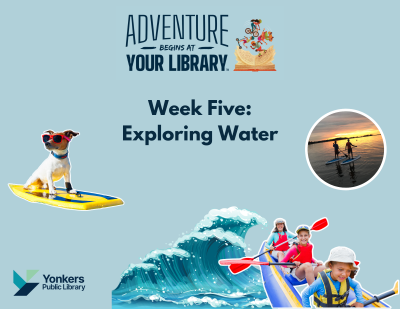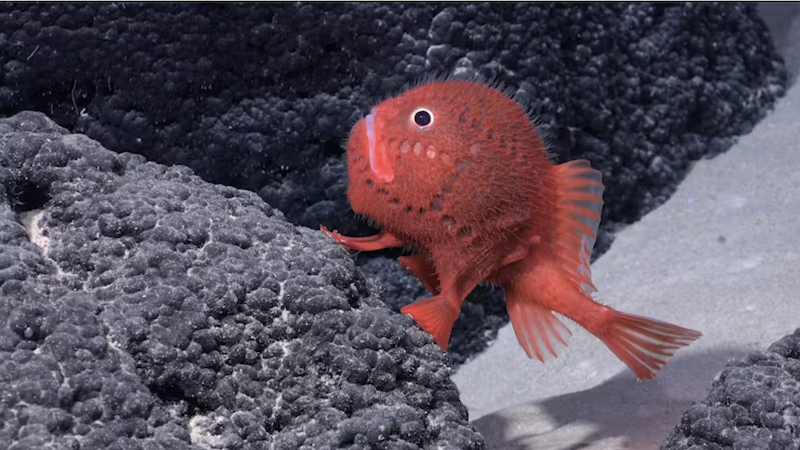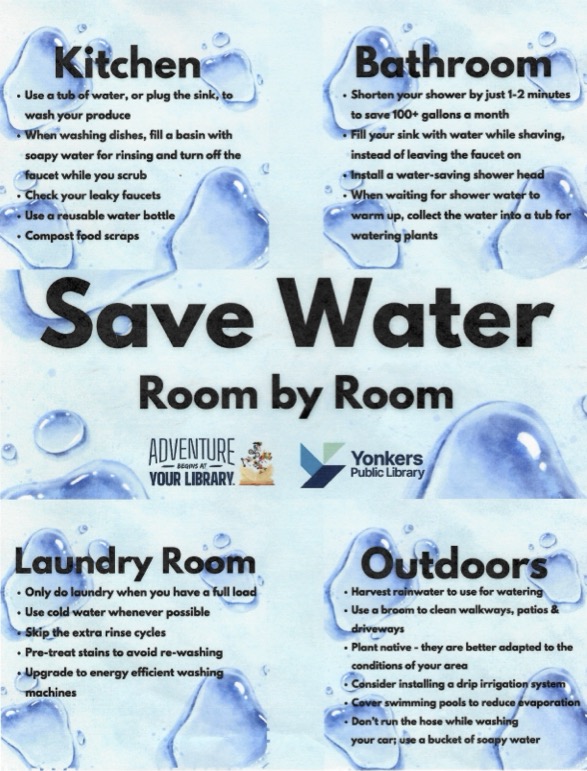
"Adventure Begins at Your Library!"
To celebrate the joy of reading and bestow the spirit of adventure on your summer, the Yonkers Public Library has eight weekly themes to help you get the most out of your summer reading journey.
This week, July 22 to July 28, is “Exploring Water.”
Water is everywhere! Water makes up most of our bodies, most of the planet, and it’s critical for our survival. Read on to learn more about the our watery world!
Fun Facts
Our bodies are primarily made up of water. The average adult’s body is made up of about 60% water, but based on age, gender and body type, bodies can range anywhere from 45 to 75%.
Water is critical to sustaining our body, so it’s important to drink enough water every day! Water brings nutrients to our cells, helps us get rid of waste, protects our joints and organs, and helps to regulate our body temperature. The average adult should drink between 2-3 liters of water a day, which is somewhere between 8-12 cups. Again, this can vary based on your age, health, gender, activity level, and other factors.
According to the US Geological Survey, 71% of the Earth’s surface is covered in water, and oceans hold more than 96% of the Earth’s water supply. The rest of the Earth’s water exists in rivers, lakes, aquifers, glaciers, or in water vapor.
The Bureau of Ocean Energy Management reports that 80% of the global ocean is unmapped, meaning we have not rendered a map of the sea floor. However, even more of the ocean has gone physically unexplored due to intense water pressure in deep ocean water, near-zero visibility, and cold water temperatures. This means that there are many creatures living in the ocean that we have never seen before. In fact, a recent deep sea expedition has possibly uncovered more than 100 new species of animals in the Pacific Ocean, including this bright red sea creature that uses its fins like hands to “walk” across the sea floor.

Freshwater habitats - think, any body of water that isn’t the salty ocean - are also incredibly diverse ecosystems. Many creatures live in freshwater like rivers, marshes and ponds, including: snails, worms, turtles, frogs, birds, beavers, otters, snakes, mollusks, alligators, and insects.
If you’re looking to learn more, take advantage of some of our online digital resources like Britannica Academic to do some research of your own. Learn about ecology, oceanology, conservation efforts, and more!
Water Conservation
Speaking of water conservation, fresh drinking water is an invaluable resource for all people around the world. However, according to the 2024 United Nations World Water Development Report, there are many factors that put access to fresh water at risk. Climate change, geopolitical unrest, pandemics, mass migration, hyperinflation, and other crises can make it more difficult for people around the world to access drinkable water. More than 1 billion people were affected by droughts between 2002 and 2021, and more than 2 billion people had no access to safe drinking water in 2022.
Save the date this fall for the National Day of Action “Imagine a Day Without Water” on October 17, 2024. Water is an essential and invaluable resource that all humans deserve to access. The US Water Alliance does research on water access in the United States. Millions of people across the country lack access to clean and safe drinking water and sanitation services, and millions more are at risk for losing water access. Black and Indigenous communities, other Communities of Color and low income communities are also deeply affected, as they are more likely to lack adequate plumbing and face water access issues. “Imagine a Day Without Water” is about raising awareness for water scarcity issues, calling for an investment in our water systems, and supporting communities in need that lack access to clean water.
There are also things you can do to conserve water in your own home. New York State recommends many ways that you can save water at home, outside, and at your job. Something as simple as turning off a running faucet, fixing a leak, or keeping your grass long so it needs less water can help conserve water in your own community.
Check out this handy graphic on how you can save water room by room in your own home.

Outdoor Water Fun
Going out and having fun in or on the water if you’re looking to stay cool this summer! If you’re the outdoorsy type, check out this list of water activities across Westchester County, from beaches to boat and kayak rentals to fishing.
If you’re looking to stay in town, Tibbetts Brook Park is a park right in Yonkers with an aquatic complex. The park features a fitness center, pickleball courts, and a pool with a lazy river.
There’s even more fun to be had reading this summer! There’s still plenty of time to sign up for Summer Reading on Beanstack. Download the Beanstack app or go to the Beanstack website on your desktop or laptop to create an account for you and your family. Check out this video to help you get started.
Participants can log books on Beanstack from June 1 to August 15 on Beanstack. For every book that you log, your name will be entered into a drawing for different prizes (i.e. Amazon gift card, prize baskets, and more). Each library branch will host its own drawing.
Check out the recommended reading lists Yonkers Public Schools Grades K-12 on the YPL website.
You can check out all of our Summer Reading themed events on the Yonkers Public Library Event Calendar.
This is a collaboration from A to Z!
Alison Robles is a Part-Time Junior Clerk at the Crestwood Library. She is an avid reader with a passion for YA lit, historical fiction and fantasy. A Yonkers native, she is currently pursuing an MS in Information and Library Science from the University at Buffalo.
Z is the Branch Administrator at the Crestwood Library. She enjoys cultivating library experiences for patrons of all ages and connecting people with resources and has been doing so for over 30 years.